初中英语语法专项介词知识讲解
- 格式:doc
- 大小:44.50 KB
- 文档页数:7
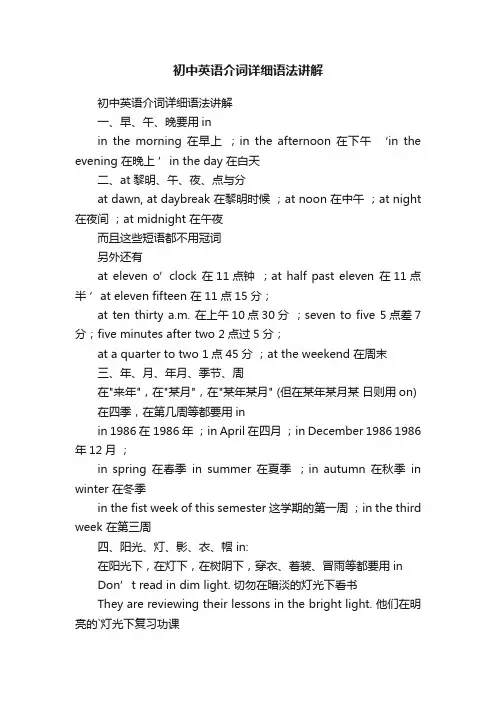
初中英语介词详细语法讲解初中英语介词详细语法讲解一、早、午、晚要用inin the morning 在早上;in the afternoon 在下午‘in the evening 在晚上’in the day 在白天二、at黎明、午、夜、点与分at dawn, at daybreak 在黎明时候;at noon 在中午;at night 在夜间;at midnight 在午夜而且这些短语都不用冠词另外还有at eleven o’clock 在11点钟;at half past eleven 在11点半’at eleven fifteen 在11点15分;at ten thirty a.m. 在上午10点30分;seven to five 5点差7分;five minutes after two 2点过5分;at a quarter to two 1点45分;at the weekend 在周末三、年、月、年月、季节、周在"来年",在"某月",在"某年某月" (但在某年某月某日则用on) 在四季,在第几周等都要用inin 1986 在1986年;in April 在四月;in December 1986 1986年12月;in spring 在春季in summer 在夏季;in autumn 在秋季in winter 在冬季in the fist week of this semester 这学期的第一周;in the third week 在第三周四、阳光、灯、影、衣、帽 in:在阳光下,在灯下,在树阴下,穿衣、着装、冒雨等都要用inDon’t read in dim light. 切勿在暗淡的灯光下看书They are reviewing their lessons in the bright light. 他们在明亮的`灯光下复习功课They are sitting in the shade of a tree. 他们坐在树阴下乘凉a prisoner in irons 带着镣铐的囚犯He went in the rain to meet me at the station. 他冒雨到车站去接我The poor dressed (clothed) in rags in old society. 旧社会穷人们衣衫褴褛in the bright sunlight 在明亮的阳光下a merchant in disguise 乔装的商人the woman in white 穿着白色衣服的妇女in uniform 穿着制服in mourning 穿着丧服in brown shoes 穿着棕色鞋in his shirt sleeves 穿着衬衫。

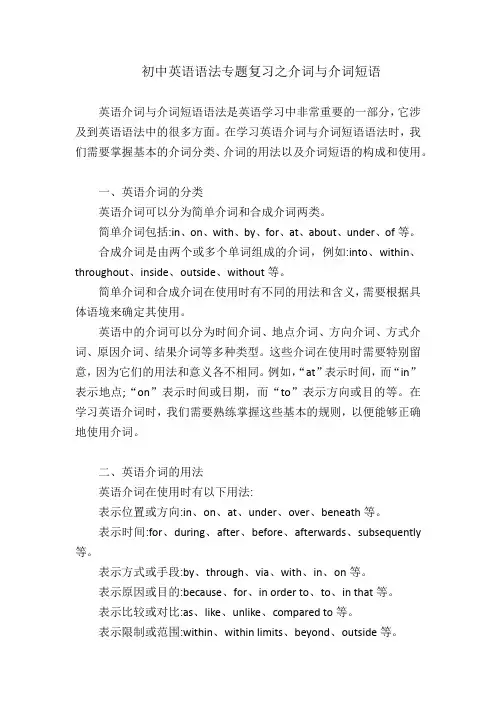
初中英语语法专题复习之介词与介词短语英语介词与介词短语语法是英语学习中非常重要的一部分,它涉及到英语语法中的很多方面。
在学习英语介词与介词短语语法时,我们需要掌握基本的介词分类、介词的用法以及介词短语的构成和使用。
一、英语介词的分类英语介词可以分为简单介词和合成介词两类。
简单介词包括:in、on、with、by、for、at、about、under、of等。
合成介词是由两个或多个单词组成的介词,例如:into、within、throughout、inside、outside、without等。
简单介词和合成介词在使用时有不同的用法和含义,需要根据具体语境来确定其使用。
英语中的介词可以分为时间介词、地点介词、方向介词、方式介词、原因介词、结果介词等多种类型。
这些介词在使用时需要特别留意,因为它们的用法和意义各不相同。
例如,“at”表示时间,而“in”表示地点;“on”表示时间或日期,而“to”表示方向或目的等。
在学习英语介词时,我们需要熟练掌握这些基本的规则,以便能够正确地使用介词。
二、英语介词的用法英语介词在使用时有以下用法:表示位置或方向:in、on、at、under、over、beneath等。
表示时间:for、during、after、before、afterwards、subsequently 等。
表示方式或手段:by、through、via、with、in、on等。
表示原因或目的:because、for、in order to、to、in that等。
表示比较或对比:as、like、unlike、compared to等。
表示限制或范围:within、within limits、beyond、outside等。
表示数量或程度:twice、three times、once、twice as much等。
表示空间关系:next to、beneath、above、on the other hand等。


初中英语介词语法讲解(精华)(名师总结必考语法,建议下载背诵)是什么介词又称前置词,是一种虚词,表示名词或代词和句中其他词之间的关系。
介词不能单独作句子成分,通常放在名词或代词前,构成介词短语。
通常介词短语才能做句子成分。
在介词后面的名词或者代词又可以称为介词的宾语。
其后若是代词,须用宾格。
分类介词短语的构成与句法功能可作介词宾语的词语介词和其他词类的搭配相似、相近介词用法区别专项练习一、填空题1.Oh, my clothes are ____ fashion. I need to buy new ones.2.Welcome ________the best restaurant in the town.3.Linda doesn't look very well. I'm worried________her.4.The museum is open________Monday to Friday.5.Now Chinese teenagers have p________ of chances to take part in all kinds of outdoor activities.参考答案:out of, to, about, from, plenty二、单选题1.My hats and tapes are _________.A. on the bedB. under deskC. in roomD. under the my bed2.— Hangzhou is known ________ the West Lake.— Yes. I have been there twice.A. asB. forC. ofD. with3.When you're invited to have dinner at home by an American friend, you should be _______ or alittle later. It's different from our Chinese custom.A. on timeB. on businessC. on show4.— Is Lara similar ________ Tina?— Yes, they're twins (双胞胎). But in some ways, they are different ________ each other.A. with; byB. to; fromC. like; ofD. as; about5.You should come to school ____________.A. in timeB. on timeC. at the same timeD. all the time6.In the end, we sent a Thanks-card and some flowers to Miss King.A. At lastB. At firstC. At onceD. At present7.Where do Tom and John sit ?Tom sits __________ of the room and John sits _________ of the room.A. in front; at backB. in the front; at the backC. in front; at the backD. in the front; at back8.The radio says that a terrible traffic accident happened sometime ________ 8 a.m. ________ 10a.m. this morning.A. between; andB. from; toC. between; toD. from; and9.There is a big tree _____________our classroom.A. in the front ofB. in the center ofC. at the back ofD. in front of10.I am sitting _________ my best friend in the cinema now.A. frontB. in frontC. in front ofD. in the front of参考答案:ABABB ABADC。
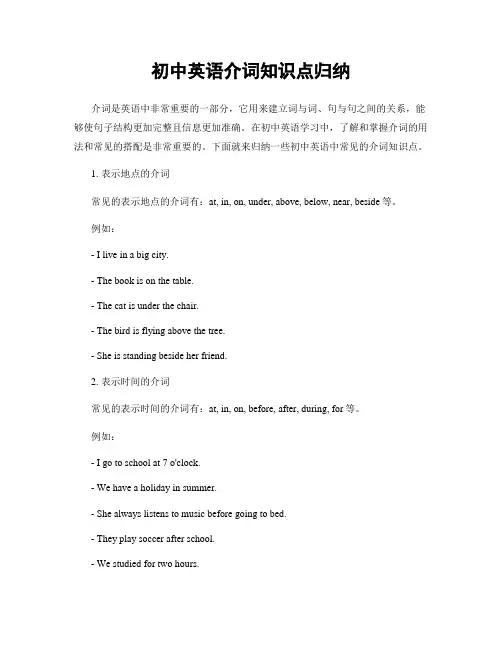
初中英语介词知识点归纳介词是英语中非常重要的一部分,它用来建立词与词、句与句之间的关系,能够使句子结构更加完整且信息更加准确。
在初中英语学习中,了解和掌握介词的用法和常见的搭配是非常重要的。
下面就来归纳一些初中英语中常见的介词知识点。
1. 表示地点的介词常见的表示地点的介词有:at, in, on, under, above, below, near, beside等。
例如:- I live in a big city.- The book is on the table.- The cat is under the chair.- The bird is flying above the tree.- She is standing beside her friend.2. 表示时间的介词常见的表示时间的介词有:at, in, on, before, after, during, for等。
例如:- I go to school at 7 o'clock.- We have a holiday in summer.- She always listens to music before going to bed.- They play soccer after school.- We studied for two hours.3. 表示原因的介词常见的表示原因的介词有:because of, due to, thanks to等。
例如:- He couldn't come because of the bad weather.- The match was canceled due to the heavy rain.- Thanks to your help, I finished my homework.4. 表示目的的介词常见的表示目的的介词有:for, to等。
例如:- He bought a gift for his mother.- She went to the supermarket to buy some food.5. 表示方式的介词常见的表示方式的介词有:by, with等。


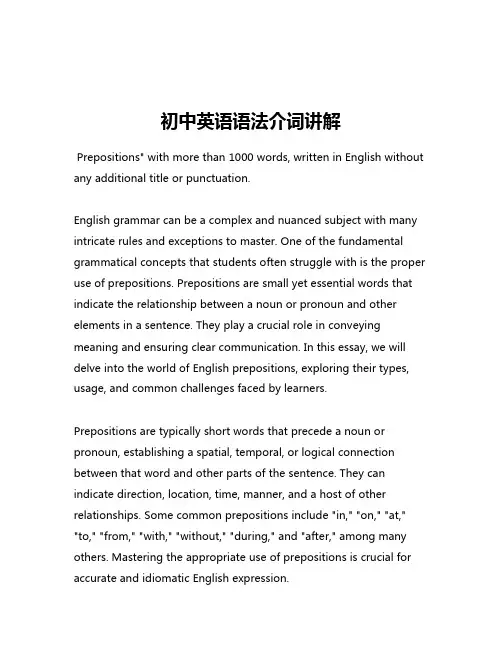
初中英语语法介词讲解Prepositions" with more than 1000 words, written in English without any additional title or punctuation.English grammar can be a complex and nuanced subject with many intricate rules and exceptions to master. One of the fundamental grammatical concepts that students often struggle with is the proper use of prepositions. Prepositions are small yet essential words that indicate the relationship between a noun or pronoun and other elements in a sentence. They play a crucial role in conveying meaning and ensuring clear communication. In this essay, we will delve into the world of English prepositions, exploring their types, usage, and common challenges faced by learners.Prepositions are typically short words that precede a noun or pronoun, establishing a spatial, temporal, or logical connection between that word and other parts of the sentence. They can indicate direction, location, time, manner, and a host of other relationships. Some common prepositions include "in," "on," "at," "to," "from," "with," "without," "during," and "after," among many others. Mastering the appropriate use of prepositions is crucial for accurate and idiomatic English expression.One of the primary challenges in using prepositions correctly is the fact that they often do not have a direct one-to-one translation from one language to another. What may be expressed using a particular preposition in English may require a different preposition or even a completely different grammatical structure in another language. This can lead to common mistakes made by non-native English speakers, such as using the wrong preposition or omitting a preposition entirely.For example, in English, we say "I am going to the park," using the preposition "to" to indicate the destination. However, in Spanish, the equivalent phrase would be "Voy al parque," using the preposition "a" instead. Similarly, in English, we say "I am interested in learning Spanish," but in French, the equivalent would be "Je suis intéressé par l'apprentissage de l'espagnol," using the preposition "par" instead of "in."Another complexity in the use of prepositions arises from the fact that they can have multiple meanings and usages, depending on the context. The preposition "in," for instance, can be used to indicate location ("I am in the house"), time ("I will arrive in the afternoon"), or a state of being ("I am in a good mood"). Learners must be able to discern the appropriate meaning and application of a preposition based on the specific context of the sentence.Furthermore, prepositions can sometimes be used idiomatically, where their meaning cannot be directly derived from the individual words. Expressions like "look forward to," "take care of," and "in the long run" are examples of idiomatic prepositional phrases that must be learned and understood as a whole, rather than by analyzing the individual components.To help students overcome the challenges of preposition usage, it is essential to provide them with ample practice and exposure to a wide range of prepositional patterns and contexts. This can be achieved through various teaching methods, such as grammar exercises, sentence completion activities, and exposure to authentic English texts and conversations.One effective approach is to group prepositions into categories based on their common functions, such as prepositions of location, time, direction, and manner. By understanding the broader conceptual categories that prepositions belong to, students can more easily remember and apply the appropriate prepositions in different contexts.Additionally, it is crucial to encourage students to pay close attention to preposition usage in the input they receive, whether it's through reading, listening, or observing native speakers. By actively noticingand analyzing how prepositions are used in real-world communication, students can develop a more intuitive understanding of their proper application.Another valuable strategy is to encourage students to consult reference materials, such as grammar books or online resources, whenever they are unsure about the correct preposition to use. By developing the habit of checking and verifying their understanding, students can gradually build a more robust knowledge of preposition usage.In conclusion, prepositions are a fundamental aspect of English grammar that deserve careful attention and practice. By understanding the various types of prepositions, their multiple meanings and idiomatic usages, and engaging in targeted exercises and exposure to authentic language, students can overcome the challenges of preposition usage and develop a more confident and accurate command of the English language. With persistence and a willingness to learn, mastering prepositions can be a rewarding and essential step in the journey of becoming a proficient English speaker.。

初中英语语法:英语介词口诀详解在初中英语学习中,语法是一个重要的部分,而介词的运用更是让许多同学感到头疼。
不过,别担心,今天我们就来通过一些口诀详细地解读一下初中英语中的介词。
一、关于时间的介词“in 年 in 月 in 季,on 日 on 号 on 星期”,这是我们首先要记住的口诀。
比如说,“in 2023”(在 2023 年),“in May”(在五月),“in spring”(在春天);而“on Monday”(在星期一),“on June 1st”(在 6 月 1 日),“on a sunny day”(在一个晴朗的日子)。
但要注意,如果具体到某一天的上午、下午或晚上,就要用“on”。
例如,“on the morning of June 1st”(在 6 月 1 日的上午)。
“at 用于时刻前,黎明午夜和点分”。
“at six o'clock”(在六点钟),“at noon”(在中午),“at midnight”(在午夜)。
二、关于方位的介词“in 在里,on 在上,at 表示小地点”。
“in the room”(在房间里),“on the table”(在桌子上),“at the bus stop”(在公交车站)。
“between 两者之间,among 三者或以上之中”。
例如,“The ball is between the two chairs”(球在两把椅子之间。
)“He is the tallest among the students”(他是学生中最高的。
)“in front of 外部的前面,in the front of 内部的前面”。
“There is a tree in front of the house”(房子前面有一棵树。
)“The teacher i s standing in the front of the classroom”(老师站在教室的前面。
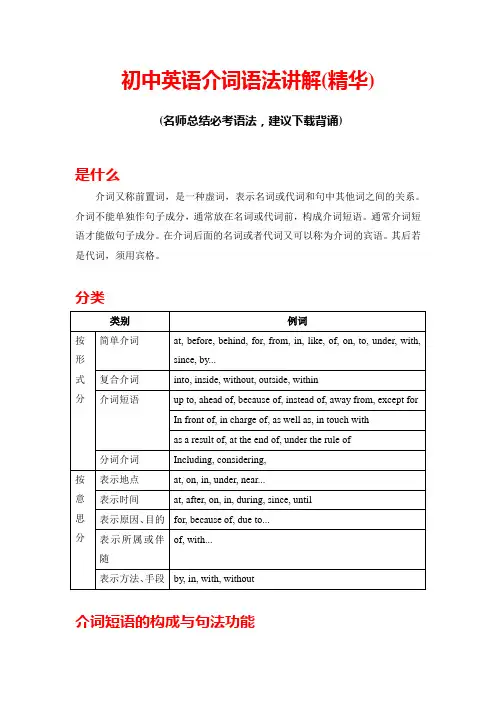
初中英语介词语法讲解(精华) (名师总结必考语法,建议下载背诵) 是什么 介词又称前置词,是一种虚词,表示名词或代词和句中其他词之间的关系。介词不能单独作句子成分,通常放在名词或代词前,构成介词短语。通常介词短语才能做句子成分。在介词后面的名词或者代词又可以称为介词的宾语。其后若是代词,须用宾格。
分类 类别 例词 按形式分 简单介词 at, before, behind, for, from, in, like, of, on, to, under, with, since, by... 复合介词 into, inside, without, outside, within 介词短语 up to, ahead of, because of, instead of, away from, except for In front of, in charge of, as well as, in touch with as a result of, at the end of, under the rule of 分词介词 Including, considering, 按意思分 表示地点 at, on, in, under, near... 表示时间 at, after, on, in, during, since, until 表示原因、目的 for, because of, due to... 表示所属或伴随 of, with...
表示方法、手段 by, in, with, without 介词短语的构成与句法功能 构成 功能 举例 备注 介词+名词 介词+宾格代词 介词+副词 状语 Hope for the best and prepare for the worst. Danny has been working here since 1998. 介词短语作定语时,要放在其中心词之后;作状语时,位置比较灵活。 定语 The pears on the table are for you.
介词介词是一种虚词,不能独立充当句子成分,需与动词、形容词和名词搭配,才能在句子中充当成分。
介词是用于名词或代词之前,表示词与词之间关系的词类,介词常与动词、形容词和名词搭配表示不同意义。
介词短语中介词后接名词、代词或可以替代名词的词(如:动名词v-ing).介词后的代词永远为宾格形式。
一、表示时间的介词(一)表示时间段的介词(1)in , afterin +时间段,表示从现在起往后推算一段时间after +时间段,表示过去某时间往后推算一段时间,如:He’ll come back in two days. 但点钟用after( after three o’clock)He left on July 2 and returned after three days.(2)in , during表示在一段特指的时间内,可用in 或duringThe work was done in / during the holidays.表示年份、月份、季节用in , 如:in 1999 ,in June , in winter(3)in last, for the past + 时间段, during表示在最近一段时间内,句中谓语动词常用现在完成时I have been in Shanghai in the last few years.(4)for 表示延续一段时间。
I’ll study in the U.S for two yearsI’ve waited for Bingo for half an hour.(二)表示某一时间的介词(1)at, onat 表示某一时刻,on 表示某一天或日期, 如:at 7:14, on Saturday morning on the night of May2一天内各段时间表达, 选用正确的介词,请比较:in the morningon a winter / snow / cold / morningat nighton the night of March 7thin the eveningon Friday evening(2)before, bybefore 表示某一时间之前,而by 表示到某一时间止,句中谓语动词多用完成时态。
介词(The Preposition)一、考点解读在今天的这节课中我将为同学们讲解介词这个专题。
中考对于介词的考查有一大部分是关于方位、范围的考查。
还有就是易混淆同义介词的辨析及介词的固定搭配。
我们今天将从以下几个方面进行复习:1. 介词的种类2. 介词的作用3. 介词短语与短语介词的区别4. 易混淆介词辨析二、专题梳理(一)什么是介词?介词有哪些种类?介词又称为前置词,它后面通常接名词或代词(或相当于名词作用的其他词类、短语和从句),表示后接的名词或代词与句中其他词语之间的关系。
介词可分为四类:简单介词(Simple Preposition)、合成介词(Compound Preposition)、短语介词(Phrasal Preposition)和分词介词(Participle Preposition)。
1)简单介词是指单个的介词,例如:in,at,on,over,from,under,with,by,for,about等。
2)合成介词是由两个简单介词合成的。
例如:without,into,out of,as for,onto,within等。
3)短语介词是指一个或两个简单介词和一个或几个其他种类的词构成的固定短语,其作用相当于一个介词。
例如:according to(按照),ahead of(提前),because of(因为),by means of(借助于,通过),due to(由于),in front of(在……前面),instead of(代替),on account of(因为),regardless of(不管,不顾),in spite of(尽管),on behalf of(代表某人,为了某人的利益)等。
4)分词介词是指某些由分词转化而来的介词。
例如:concerning(关于),considering(就……而论),including (包括),regarding(关于)等。
初中英语语法专项练习八——介词 一.选择填空: 1.Mrs. Brown came to China ____ 1996. A.from B.of C.to D.in 2.The room was full ____ smoke after the big fire. A.of B.with C.in D.for 3.Here are some presents ____ you ____ our best wishes. A.to; with B.for; with C.of; about D.for; for 4.Both Mr Green and Mrs Green were born ____ June, 1956. A.in B.at C.on D.for 5.The little boy is always interested ____ science. A.with B.by C.in D.at 6.Li Lei often gets up ____ seven o'clock on Sundays. A.on B.in C.at D.for 7.They arrived early ____ a Tuesday morning. A.on B.at C.in D.of 8.Macao(澳门)will return to our motherland ____ December 20th, 1999. A.on B.at C.in D.for 9.----When were you born? ----I was born ____ August 25, 1983. A.on B.in C.at D.to 10.Let me show you the place ____ the map. A.with B.on C.in 11.John knows ____ a computer. A.how to use B.how use C.how uses 12.The visitors ____ Japan arrived ____ Beijing Station last Tuesday morning. A.from; at B.of; to C.from; to D.of; on 13.The teacher will be back ____ an hour. A.in B.after C.on 14.This programme was sent to the USA ____ China ____ satellite. A.in; of B.of; in C.from; by D.by; from 15.It's cold outside. Please your warm clothes. A. put in B. take off C. put on D. put up 16.He got many gifts his birthday his friends. A. on, from B. in, of C. at, to D. from, for 17.The classroom is quite different that one. A. of B. from C. with D. like 18.Look, you'll see a bridge the river. A. on B. above C. over D. in 19.–Your coat looks nice, Is It cotton? -Yes. It's Shanghai. A. made of, made by B. made of, made in C. made for, made in D. made from made by 20.Tow may fall the others because he has missed so many lessons. A. after B. behind C. later D. out of
二、用适当的介词填空 1.What's wrong ____ your watch? 2.One ____ the students is in the classroom. 3.I think the shop is closed ____ this time of day. 4.My father teaches English ____ a school. 5.We have lunch ____ the middle of the day. 6.You can buy some school things ____ your way home. 7.I was born ____ July 1, 1982. 8.May I borrow a pencil ____ you? 9.Don't sleep ____ the open air. 10.I often help my mother ____ _ the housework. 11.It's time ____ school. 12.I have quite a lot ____ homework to do. 13.What's the time? It's half ____ seven. 14.Ducks are good ____ swimming. 15.What are you talking ____ ? 16.He is sitting ____ the front of the car. 17.The eraser was passed ____ one student ____ another. 18.Did you live ____ Beijing in 1997? 19.When did you arrive ____ the village? 20.I think Mary is ____ duty today. 21.Eating too much isn't good ____ your health. 22.I'm afraid he is ____ the cinema ____ the moment. 23.Thanks ____ asking me to your party. 24.My watch is very different ____ yours. 25.What's the weather ____ today? 26.The student is asking his teacher ____ the sports meeting. 27.The farmers are all getting ready ____ the next year. 28.The radio says the wind will stop later ____ the day. 29.Let's go out ____ a walk, shall we? 30.Tom, your mother is waiting ____ you. 31.We have noodles for lunch for lunch ____ times. 32.Harerbin is ____ the north of China. 33.The day ____ tomorrow will be windy. 34.Don't worry ____ your test. 35.I don't know which is the way ____ the park. 36.An old woman is ____ the side of the road. 37.____ the end of the road you'll see the hospital 38.He left Tokyo ____ a visit ____ Beijing. 39.Don't laugh ____ other people's mistakes. 40.He did this instead ____ me. 41.The people here are very friendly ____ us. 42.Does he learn English ____ himself? 43.I felt a little afraid ____ my teacher. 44.I'm afraid he'll fall ____ the bike. 45.Help yourselves ____ some fish, Lily and Lucy. 46.____ these words he left the classroom. 47.It was a pleasure ____ me. 48.I'm sorry I'm late ____ the meeting. 49.Study hard, or you won't catch up ____ your classmates. 50.Not far ____ him was Lin Tao.Lin Tao ran fast, too. 51.Mr Wu is going to tell us the result ____ once. 52.He goes to school early ____ usual. 53.It's another way ____ saying fast. 54.I'm sorry he doesn't agree ____ me. 55.He prefers playing football ____ playing basketball.